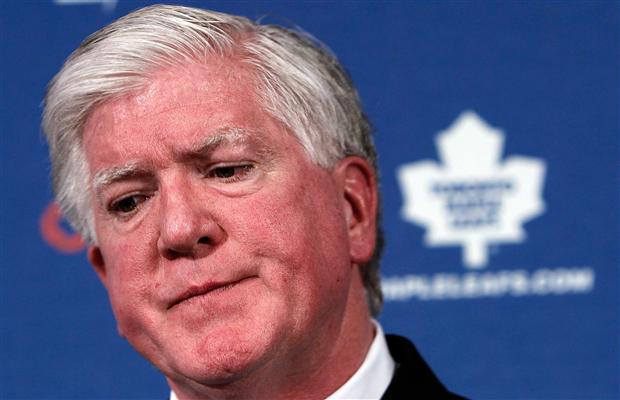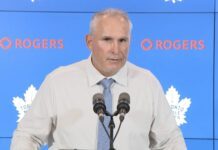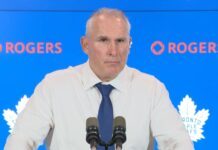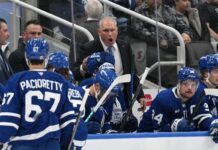
How many notable Brian Burke quotes has he unleashed for our constant reiteration? Too many to count.
You have your pugnacity, testosterone, and truculent quote, which now might be the three worst words to utter in Toronto. You have your “top six and bottom six” quote. You have your “build from the net out” spiel or the “I don’t want to get into the first round just to get my ass kicked” declaration. There’s a whole host of other gems, complaints, theories, one-liners to come out of Burke’s mouth that are now used to mock him, to cheer him, to evaluate his roster, or as Twitter handles.
But what is often forgotten, and often left not discussed, is his core belief. His central theory to building a team, which is:
“I have three pillars on all my teams. Number one is we play an entertaining style. We don’t trap, we hit in all three zones, we fight, we try to score goals, we create chances. We entertain our fans because we may not win every night, but we can still justify the cost of the ticket if we are entertaining.”
“Entertaining.”
It was always a word that stuck with me.
Now, you can waste your time and go through the fact that the Leafs don’t hit in all three zones, they don’t create scoring chances aplenty, they don’t fight and they aren’t entertaining. We all know that. That’s pretty obvious.
But the whole “entertaining” pillar in general. Now that is something.
Why? Because the only entertaining thing about hockey when you’re a fan of a team is winning. Everything else is just gravy. Do I want to see the Leafs hit, fight, and score goals like no tomorrow? Absolutely. But if they are winning games based on a trap and an amazing goalie will it be any less sweeter? Not one bit.
Winning is what is entertaining. That’s it. That is all anyone cares about in this market. Do you win games, or do you lose them? Is it sustainable? Will it lead to the playoffs, and if it does will you actually be able to win some playoff games, too?
Now it should be said that this is part of Burke’s blueprint. Being an exciting hockey team is what Burke wants.
Make no mistake, when the Leafs were cruising in January, playing their open run and gun style, Burke and co. were loving it. They may have not had the physicality and size desired, but other than that the complains were few and far between.
But on a grim Tuesday after another failed season, being an exciting team seemed to be the furthest thing from Burke’s mind during his state of the Leafs media address. Winning is what he desires, and it is the only thing he desires, regardless of how he gets there.
He is tired, the fans are tired, everyone is tired, and we all just want wins. It wasn’t a press conference full of excuses, or weak comments; it was Burke being as honest as he could without completely throwing the team under the bus.
The telling quote to me, out of everything said, was this, “It’s time for this team to play a full season. Not 30 good games, or 40 good games. No talk of if you combine this half with that half, that’s not going to fly anymore.”
Burke has spent time tearing down the organization he inherited, building, developing and bringing in new guys to make it the one he wants, and then waiting for guys to develop. But he knows if he doesn’t deliver a winner next season, this time next year he’ll be holding a different kind of press conference.
This was the first season Burke never made any moves to the NHL roster to bring in outside help mid-season. He lived and died by this group, and this group died.
If there was one thing Burke has been reminding people of over the years it’s the Leafs record with Dion Phaneuf in the lineup. Burke tweeted at the end of the November, “the Leafs record since the Phaneuf deal: 64-52-16” and their “record with him in the lineup in that time: 59-44-13.”
But there was Phaneuf during the Leafs collapse, front and center. And the collapse started well before Lupul got hurt, or Kulemin or anyone else. Everyone was there, everyone that Burke acquired or retained. And that makes all the difference. There’s no excuses that could come from Burke. He believed in a group, said all season he wouldn’t bet against them, and then they folded.
Up until now he has been building the product and adding to it, but this had to be the first time where Burke and his staff really looked at the group in the closing months and said we need to do something drastically different. Be that in net, on defense or at forward, they have to change something big time. That started with the coach, and will lend itself to to the roster now.
So when Brian Burke is going through this summer and looking through who he can and should add to his roster, hopefully he’s not wondering if this team will play “exciting” hockey, because the only exciting thing at the end of the day is winning.
Just ask the Nashville Predators.
***
Enough Pieces to Move
There has been a lot of talk around the web about how the Leafs will acquire players and what assets they have to actually pull off trades. Now I’m not going to go through potential players that could be available, or who the Leafs may trade from their organization, or anything like that. But I did want to point out some of the bigger trades over the last few players and what it cost to bring those players in:
Pittsburgh got:
Marian Hossa and Pascal Dupuis
For:
Angelo Esposito, Erik Christensen, Colby Armstrong, 1st round draft pick
San Jose got:
Joe Thornton
For:
Brad Stuart, Wayne Primeau, Marco Sturm
San Jose got:
Dan Boyle and Brad Lukowich
For:
Matt Carle, Ty Wishart, 1st round pick, 4th round pick
Dallas got:
Brad Richards and Johan Holmqvist
For:
Jussi Jokinen, Mike Smith, Jeff Halpen, 4th round pick
Vancouver got:
Roberto Luongo, Lukas Krajicek, 6th round pick
For:
Todd Bertuzzi, Bryan Allen, Alex Auld
None of these blockbusters are packages the Leafs would be in tough to put competitive offers against, or undo-able for the organization without blowing a giant hole in it. Who is worth what in the Leafs organization is of course, always up for debate, but to suggest that they don’t have the assets to pull off a big deal or two this summer is ludicrous. Brian Burke has spent time building up the Leafs cupboard up, and while it isn’t time for him to tear it down and make a bunch of trades, he now has enough in it that he can afford to package pieces together and upgrade the big club. Time will tell. But he’s certainly capable and has more than enough at his disposal to put together packages for players.
***
Right and Wrong: Reviewing the team’s and my own performance
I wasn’t positive on how or what to write for the final Leafs Notebook of the year, and I’m still not quite sure, but I thought the best thing I could do is look through things I was right about and things I was wrong about throughout the year. It’s the best way to keep Leafs Notebook honest, and if I’m going to throw out ideas, suggestions, statements and what not, it makes sense to see what ended up becoming of everything.
So critique my critiques, match them to your own, have fun with it. Evaluating hockey is always an on-going process. If everyone was always 100% right, where would the fun come from?
WRONG
1) The Leafs Will Make the Playoffs.
I made this clear throughout the season, and there were always two reasons that I pointed out as to why the Leafs would make the playoffs.
The first is that they are the eighth best team on paper, in the East. Other than Lupul having the surprising year that he did and Gardiner coming out of nowhere to make the roster, and maybe Tyler Bozak developing (but seriously, the signs were there last season from Bozak), no one on the team really outplayed expectations. Perhaps Kessel did to a degree, but he didn’t do anything out of the question, he just took the next step in his development which was reasonably expected. On the downside, though? Nikolai Kulemin had seven goals this year, Tim Connolly had his worst point per game ratio in a decade, Matt Lombardi never found his game – we all knew it would take awhile, but not at all? -, God knows what happened to Luke Schenn, Reimer got hurt and was never the same, on and on it goes. But this was a playoff capable team on paper and I thought they’d put it together and get the job done.
The second reason I thought they would make the playoffs is because I thought Burke recognized the need to make them, and would go all out to do so. That was only magnified when they traded for Dave Steckel. In previous seasons Burke and his staff usually allowed a Marlies player to win a spot like that (Tim Brent, John Mitchell, etc. etc.), but to start this season he went out and acquired a legitimate, established, solid NHLer. I thought that was a sign of things to come, and that Burke would make the necessary moves to qualify for the playoffs throughout the year because he understood the importance of making it this season to continue the team’s development, and also because he wanted to help Ron Wilson. Guess not.
2) Tim Connolly.
I was basically just wrong here, on pretty well every account. I speculated that Connolly might be a good player to use on the point for the power play and to pair him with John Michael Liles. That never happened, and he was never used on the point for the power play this year, ever.
Dion Phaneuf got off to a great start there and the Leafs ran with him on the first unit power play all season no matter what was happening. Phaneuf finished with 22 points there. Now perhaps they should have changed it up and put Connolly there during dips, if anything it would have meant less minutes played for Phaneuf, but they didn’t.
Connolly had 19 power play points last year, this season he had five. That’s a career low for him.
I also thought that he would be able to click with Kessel and put up a respectable point total this season. Not a 65+ point season, but something around a 50-55 point one. Connolly has outstanding hands, an underrated shot and can move around more than adequately on the ice, but it didn’t click because he doesn’t win battles like Tyler Bozak does, nor is he strong at the dot like Bozak is. Perhaps I should have realized that if Connolly didn’t fit with Kessel, he automatically would have been dropped to the third line because Grabovski holds the number two center spot. Due to that, I should have managed my expectations better.
That said, I said Connolly was the Leafs best defensive forward positionally speaking since Mike Peca, and I stand by that. He has superb defensive awareness and his penalty killing abilities were a big reason for the Leafs turnaround in that department.
3) Thinking Kadri was fully ready for the NHL during his second last call-up.
When Nazem Kadri got called up on December 22nd, I thought he was ready to stick in the NHL for the rest of the season. I didn’t think it would be smooth sailing, but I thought it was time that they keep him up for the remainder of the year and really evaluate him as best they could, and also give him the much-needed experience. He started off with three points in his first six games, then proceeded to score one in his next ten.
Obviously that offensive production is not acceptable for a guy who was supposed to be scoring and contributing to the offensive side of things. Kadri consistently received 12-14 minutes a night during those 16 games, so it wasn’t as if he was deprived of opportunity; Kadri was just unable to score to justify his roster spot as others began to get healthy.
Now, hindsight being 20-20, would it have been better for Kadri to just stay up and gain that experience considering they didn’t make the playoffs anyways? You can probably make a good debate for that. But at the time that they sent him down, it was well deserved, so I was wrong.
4) The veterans coming through.
The Leafs needed veterans throughout their run to step up. Now, I never believed that Tim Connolly, Matt Lombardi or Colby Armstrong were the greatest veterans, or the most grizzled, but I did believe they were veterans who could help steer this team in the right direction in tough times. Clearly, that never happened.
I guess, in some sort of weak consolation, I was right about the fact that the Leafs needed veterans down the stretch, just not the veterans that are presently in their organization. I thought a guy like Armstrong was going to come back from injury, get his game together and make a difference. Instead, he was often the worst player on the ice.
Simply put, I missed the boat here by more than a few miles. I was talking about a boat on a completely different ocean.
RIGHT
1) Ron Wilson is a Good Coach.
To me, coaching is the most overrated thing in all of sports. Now don’t get me wrong, coaching can make a significant impact on structurally building your on-ice product, keeping player morale up and getting the most out of the individuals that you have (Look no further than Ottawa, we always knew Spezza was this good, now he’s playing like it. But the piece was already there.).
Wilson became the scapegoat of fan ire the last few years and rarely did I see a problem, or not understand Wilson’s point of view or reason for doing something, so it just never made sense to me. Ultimately people will look back at Wilson’s time here as a failure – and it was – but it had much more to do with their roster and lack of goaltending than anything Wilson should have done, or did do.
Bottom line, when Wilson was fired, a lot of people thought the Leafs would become better just because of the coaching change and bringing in a better coach. But they weren’t. Had the team re-grouped, played great and made the playoffs, this would have been in the “wrong” category. But no, it was the same mistakes under Carlyle as it was for Wilson.
When you start a game and nine seconds in Luke Schenn fans on a puck and the Florida Panthers score, that’s not Ron Wilson’s fault. Or when Marcus Johansson attempts a routine wraparound and actually scores less than a minute in, that’s not Ron Wilson’s fault. For some reason though, things like that -“the team not being ready to start the game”- was being pitted on Wilson.
Coaches are only as good as the players they are provided, but in a lot of markets when things are going bad the coach is the convenient scapegoat.
2) That the Coach is the reason the penalty kill sucks, and the team doesn’t hit
These were by far the two questions I received the most.
The bottom line is that the Leafs sustained strong penalty killing over long stretches of time. They were solidly over 80% for two months and 100% for one month. When they are that good for that long of a sample, that, to me, suggests it is not the system in place that is failing. It is the players themselves failing to execute.
Furthermore, give the Leafs players some good – not average, below average, or mediocre – goaltending and the penalty killing would have been more than fine. Ultimately, coaches do take responsibility for the special team units, but such fluctuations in play and effectiveness pit the blame on the players, not the system. The system clearly worked, when they executed it.
Hitting was another thing I was asked about quite often. Obviously, as we have found out, Burke and Wilson didn’t see eye-to-eye on the physical part of the game. That said, a lot of people believed this team should be hitting more than they did, and my answer was always that they simply didn’t have the size or ability or mentality within their players to do so.
When Randy Carlyle came in, he clearly tried to play a more physical style, and there was definitely a mandate to hit more, yet there was no real indication that this team played anymore physical than before. Sure there were maybe a few more fights, and a little more effort to finish checks, but in terms of any sort of noteworthy difference? Hardly.
The Leafs just don’t have the bodies or personnel to take the body consistently and everyone sees that, including Brian Burke. Expect that to be rectified going into next season.
3) Calling up Carter Ashton over Kadri signaled tanking.
This, to me, was the final “we know we are out.” Calling up Carter Ashton made a ton of sense… for next year. They received a good look at Ashton against other NHLers and now they can gauge him and pencil him into either the Marlies or Leafs accordingly for next season.
A team that is seriously trying to make the playoffs does not call-up a younger, less talented player who’s never played in the NHL over a guy who has already played 51 NHL games and has shown he can score and put up respectable numbers. Especially after your second leading scorer gets hurt, thus creating the hole in your lineup in the first place.
As if that wasn’t enough evidence, Ashton didn’t put up a point in 15 games and played under 10 minutes numerous times during the stretch, whereas Kadri played two games, scored once, and was generally speaking dangerous.
It was a clear indication that management was already looking ahead to the next season. Perhaps the players caught on and that’s the reason they played the way they did to close out the year? (I’m half joking, half serious).
4) Carlyle making no impact – it’s about the players.
I was pretty shocked at the amount of backlash this comment received. A lot of people honestly thought Randy Carlyle was going to come in and right the ship fairly quickly and make a huge difference. Obviously, he didn’t. This goes back to point number one; coaches are coaches, not miracle workers.
In Brian Burke’s end-of-season press conference he brought up that new coaches historically do not see dramatic turnarounds. That should tell you everything you need to know. It was exactly like I said: Carlyle’s hiring, for the rest of the season, was not about Randy Carlyle. It was about the players stepping up and showing they belong here.
Now, did a lot of players do that? No. But that only hurts them. The season was more or less already a wash at the point Carlyle came in and too many people were hoping Carlyle would turn it around and save it.
Side note: Players who did help their cause? Dave Steckel, Joey Crabb, Matt Frattin and Jake Gardiner all played good to great hockey to close out the year.
Yes, the Leafs were still technically in the playoff hunt at the time Carlyle got hired, but he was never hired to turn around the remainder of this season. It was always about the future. The judgment on Carlyle begins next year.
***
A Personal Aside – Thank You
I want to extend a quick thank-you to everyone. While this is the last Leafs Notebook of the season, I do have a few articles in the works (that will be much shorter than a Leafs Notebook), so I will be popping up here on the site whenever I have a chance to and there will of course be notable things to write about such as the draft, UFA signings, trades, and so on, until next year.
Beyond that though, I had a blast writing here every week and interacting with everyone whenever I had the opportunity to do so. You guys -and girls – are what makes this site great and you always made me want to write more, and better, insight for you. I hope you enjoyed it as much as I did. Thanks for making this a great experience.


































